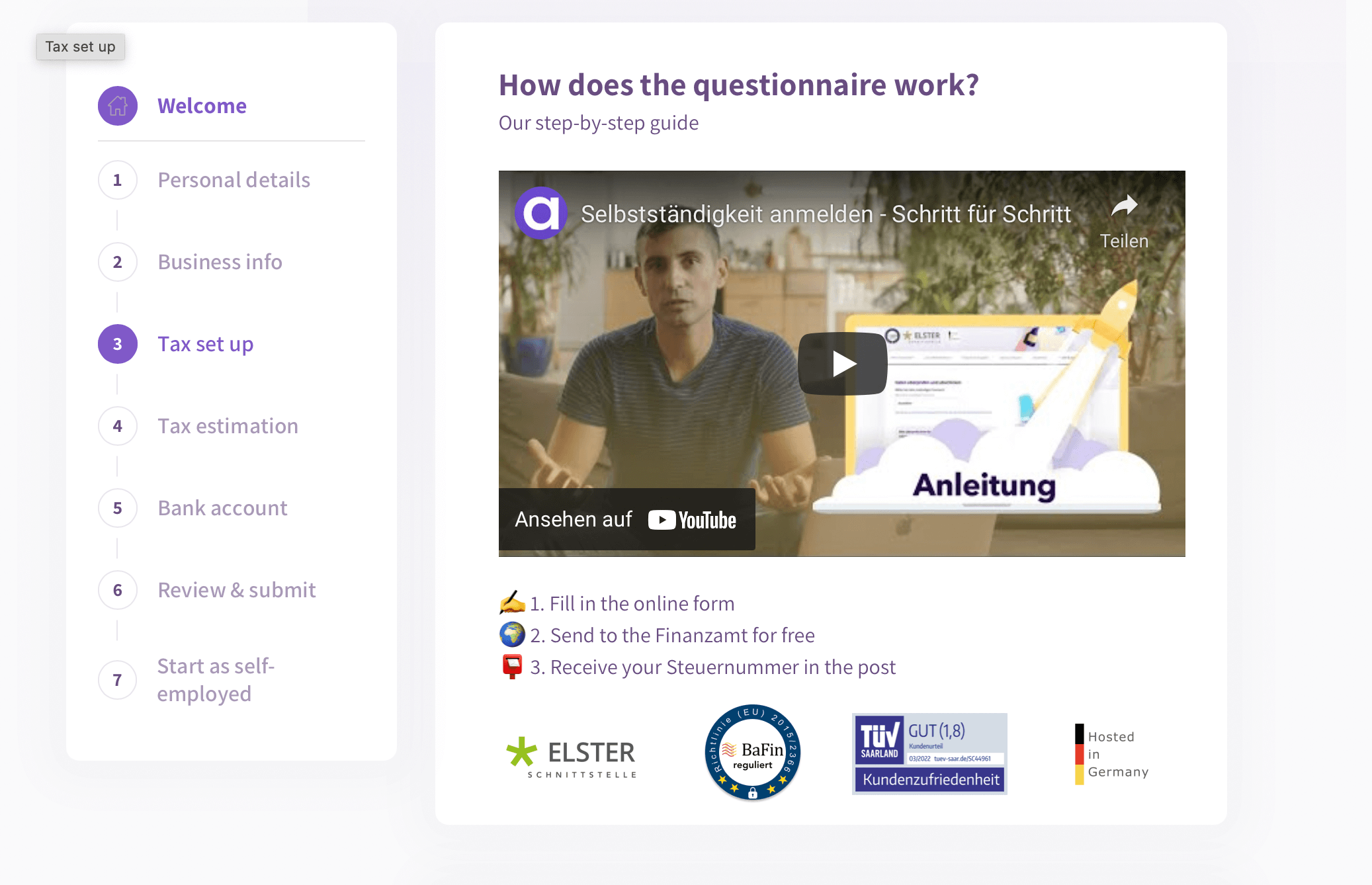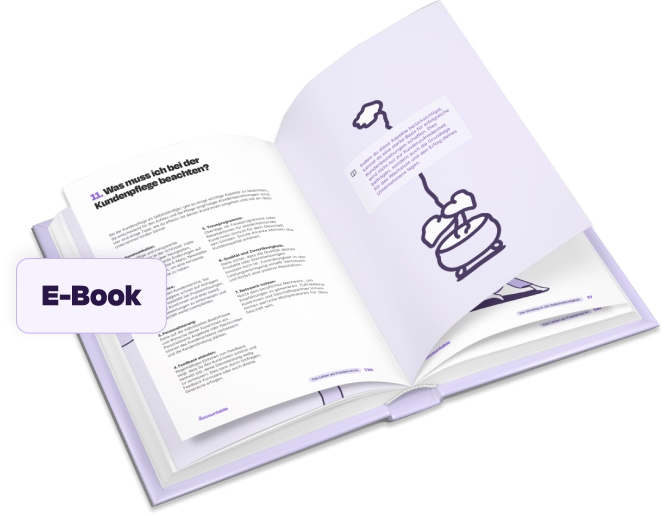The Kleinunternehmerregelung (small business regulation) can make it a lot easier for you to start your own business: you have less work with bookkeeping and do not have to include Umsatzsteuer (VAT - value added tax) on your invoices.
Therefore, this detailed guide is all about the Kleinunternehmerregelung.
Here you will learn what this regulation is about, for whom it is relevant and how you can apply for it, as well as what taxes you will still have to pay as a Kleinunternehmer (small business owner).
Contents
In Germany, every company must charge VAT on its products or services and remit it to the Finanzamt (tax office). But there is one exception in German tax law that exempts you from paying VAT: The Kleinunternehmerregelung.
Definition of a Kleinunternehmen
The Gabler Wirtschaftslexikon defines a small business as follows:
'Kleinunternehmer are entrepreneurs whose income is so low that the Value Added Tax Act does not expect them to fulfill their VAT obligations'.
('Kleinunternehmer sind Unternehmer, deren Umsatz so geringfügig ist, dass das Umsatzsteuergesetz ihnen in wesentlichen Punkten die Erfüllung der umsatzsteuerlichen Pflichten nicht zumuten will'.)
This also means a Kleinunternehmen cannot exceed a certain income limit. Only then can it be exempt from paying VAT.
The income limit is at 25.000 EUR for Kleinunternehmer. This means that if you do not make more money than 25.000 EUR in the first year of your self-employment and also no more than 100.000 EUR in the second year, you can register as a Kleinunternehmer.
➡️ Here, you find all the details about the limit for Kleinunternehmer.
It is not always profitable for everyone to make use of the Kleinunternehmerregelung. However, there are several situations where it does make sense:
Your clients are mostly private customers
If you do not make use of the Kleinunternehmerregelung, you must add the appropriate VAT rate to your prices. This is not a problem for corporate clients because they are also subject to VAT, so they can reclaim the VAT paid to you from the Finanzamt (tax office).
Private clients, on the other hand, have to pay the higher price due to VAT out of their own pockets. This makes you more expensive for them. Thus, there might be the risk of them preferring to work with a Kleinunternehmer with lower net prices.
In other words, should you primarily work with private customers, you can convince them with better prices, hence making yourself more attractive to them. In this case, it is worth applying the Kleinunternehmerregelung.
Anyone reporting VAT not only has to submit an annual VAT return (Umsatzsteuererklärung) at the end of the year, but also regularly submit VAT returns (Umsatzsteuervoranmeldungen) to the Finanzamt.
This additional accounting effort can cost a lot of time and is often a major obstacle, especially for freelancers at the beginning of their career.
You save yourself from this painful work by making use of the Kleinunternehmerregelung.
If you report VAT, you can also reclaim the VAT paid for business expenses. However, if you have little or no expenses for your work, the Kleinunternehmerregelung might serve you better at this point. Because if you don't have any purchases, you will not suffer any financial disadvantage by using the Kleinunternehmerregelung, while still making use of all advantages described above.
➡️ Click here to find out more about when freelancers should make use of the Kleinunternehmerregelung.
It can happen that you make more income in a year than planned. If you have exceeded the limit for the Kleinunternehmerregelung, you automatically switch to the so-called Regelbesteuerung (standard taxation). This means that you will have to report VAT, usually from next year on.
If this happens in the first year of your self-employment, you still retain the status of a Kleinunternehmer for this period and only switch to standard taxation from the second year onwards.
The change from Kleinunternehmen to standard taxation can also happen voluntarily, without you exceeding the income limits. You don't even have to submit an application for this: It's enough if you state the VAT and pay it to the Finanzamt. This is already considered an official waiver of the Kleinunternehmerregelung.
➡️ This is how you change from Kleinunternehmer to subject to VAT - it's easier than you think.
You can directly register as a Kleinunternehmer when registering your freelance work or your company (Gewerbe), since even Kleinunternehmer can register as Gewerbe.
The registration of your self-employment as Kleinunternehmen can be done via the 'Fragebogen zur steuerlichen Erfassung' (questionnaire for tax registration). All you have to do is tick the appropriate boxes on the form to register as a Kleinunternehmer.
It is also no problem, should you decide to make use of the Kleinunternehmerregelung after your initial tax registration. In this case, you simply have to contact the Finanzamt responsible for you and register for it afterwards.
➡️ Click here to find out how to correctly fill out the questionnaire for tax registration.
Even Kleinunternehmer need to send proper invoices in order to get paid for their services. However, there is a clear difference between invoices of Kleinunternehmer and invoices of freelancers who are subject to VAT. The latter not only show the total amount of the invoice, but they also include the corresponding VAT rate. For Kleinunternehmer, though, no VAT rate needs to be included.
However, in order to be allowed to disregard the VAT rate on your invoice, you must give reason for it. Meaning you must therefore indicate the use of the Kleinunternehmerregelung on your invoice. The following sentence is usually sufficient for this:
'According to § 19 UStG no VAT is charged.'
(In German, that's 'Gemäß § 19 UStG wird keine Umsatzsteuer berechnet.')
Invoice template for Kleinunternehmer
By using our app and our templates, you can save a lot of time when creating your invoices as Kleinunternehmer. Click here to check out the easiest way of invoicing thanks to Accountable.
➡️ Click here to find out what else should be included on invoices for Kleinunternehmer.
As a Kleinunternehmer you can choose between statutory (public) and private health insurance. The health insurance contribution that Kleinunternehmer must pay depends on their income.
Whether private or statutory health insurance is better for you and your small business depends heavily on your individual life situation.
A popular health insurance company for Kleinunternehmer is the Künstlersozialkasse (artists’ social insurance), also known as the KSK. The KSK takes on half of the payment for health insurance, pension insurance and nursing care insurance for its members, which is exactly the amount that an employer pays to the respective health insurance company for their employees.
➡️ Here you find more important details about health insurance for freelancers and Kleinunternehmer.
Even Kleinunternehmer must pay taxes. Applying the Kleinunternehmerregelung does not generally exempt you from tax, only from paying VAT. As a Kleinunternehmer, you still have to pay Einkommensteuer (income tax) and submit an Einkommensteuererklärung (income tax return) once a year.
That being said, if you managed to stay below the general tax allowance (Grundfreibetrag), you do not have to pay any taxes as a Kleinunternehmer. The amount changes from year to year. For 2022, for example, the tax-free amount is 10.347 EUR.
Other taxes that may be relevant to a Kleinunternehmer are Gewerbesteuer (trade tax) and Lohnsteuer (income tax).
If you are a trader, you also have to pay trade tax, regardless of whether you are a Kleinunternehmeror not.
If you have employees working for your Kleinunternehmen, you also have to pay income tax.
➡️ We have a more detailed guide about the kind of taxes you have to pay as Kleinunternehmer.
Even as a Kleinunternehmer you have to prepare your tax return and depict it correctly to your corresponding Finanzamt.
You have it a little easier than self-employed people who are subject to VAT, but the information in the Einkommensteuererklärung is basically the same for all self-employed people. Like everyone else, you can also deduct a certain part of your health insurance contributions from your income, for example.
➡️ This is all about the tax return for Kleinunternehmer.
As explained above, the Kleinunternehmerregelung exempts you from paying VAT. Meaning Kleinunternehmer do not have to pay VAT or submit a Umsatzsteuererklärung (annual VAT return).
However, as a Kleinunternehmer, you can have a VAT-ID. This is used to uniquely identify a company within the European Union and can be requested from the Bundesministerium der Finanzen (Federal Ministry of Finance) both when setting up a new company and at any given time after that.
As Kleinunternehmer you are not obliged to have a VAT-ID and in most cases your Finanzamt will have you to justify why you apply for one.
➡️ Not sure if you need a VAT-ID? Read more about the different tax numbers here.
Bookkeeping is also an important topic for small business owners. Because although you don't have to submit a VAT return on a regular basis, you should always keep an eye on your finances and save important documents. Therefore, as a Kleinunternehmer, you should not neglect bookkeeping!
However, since bookkeeping for small businesses can take time and effort, it is worth getting free accounting tools and software to help, especially in the beginning.
Accountable is such a free accounting software for Kleinunternehmer. With our app you can easily create invoices and scan receipts and thus digitize your bookkeeping in 5 minutes.
➡️ Register for free and start with your accounting as Kleinunternehmer

20 Kapitel knallhart recherchiert und vom Steuerprofi geprüft
Kostenlos herunterladen

Author - Sophia Merzbach
Sophia has been a key member of the Accountable team for many years, bringing a unique blend of journalistic precision and in-depth tax expertise to her work.
Who is Sophia ?Thank you for your feedback!
Useful
How much income tax is deducted from your income is largely determined by your tax class. There are ...
Read moreWorking as a self-employed professional has many advantages: You are your own boss and you can choos...
Read moreWorking with international clients can be tricky, depending on where exactly they’re located, whet...
Read moreWas Accountable für mich so besonders macht, ist der überragende Kundenservice. Ich habe bereits mit einigen Mitarbeitern zu tun gehabt und war jedes Mal aufs Neue sehr glücklich mit der Freundlichkeit und Professionalität, mit der ich begleitet wurde. Ich fühle mich verstanden und wertgeschätzt, das ist etwas besonderes in unserer heutigen Welt. Ein großes Dankeschön 🌟
Thomas Kaiser
Accountable ist ein intuitives Tool, mit dem Buchhaltung und Steuererklärung unproblematisch erstellt werden können-
Anonym
Freundlicher Kontakt mit Wissensvermittlung und verständliche Mitteilung. Top!
Anonym
Ich mache gerade eine tolle Erfahrung mit euch.Danke für eure Unterstützung
Sandro Antonio Sansiveri
Danke ich für meinen Teil bin noch am Anfang
Anonym
Very professional, responsive, and always available to clarify my questions. The guidance was clear and practical.
Jobe Michael
Für mich als Kleinunternehmer ist der Preis ein bisschen hoch, aber für alles, was ich bekomme: alle Übersichten von Einnahmen und Ausgaben, die Funktionen rund um das Auto... ist es einfach top. Und das letzte Update zu den wiederkehrenden Ausgaben war hervorragend! Dankeschön.
Ardalan Zamanimehr
Die App ist super! Intuitiv und perfekt für Selbstständige. Leider ist meine Position noch zu exotisch für Accountable um genau diese Leichtigkeit auch in Anspruch zu nehmen. Es gibt noch keine einfache Lösung für Selbstständige mit zwei Steuernummern da zwei Berufe. Sollte sich das mal ändern, Wechsel ich von meinem Steuerberater wieder zu Accountable!
Viktor Rosin
Sehr freundlich und gezielte , verständliche Angaben und Erklärungen
Pascal Koopmann
Auf meine Anfrage habe ich sehr schnell eine sehr nette und kompetente Antwort bekommen. Die Mitarbeiterin hat mein als Verbesserungsvorschlag weitergegeben - und schon nach kurzer Zeit kam die Antwort, dass das entsprechende Feature eingearbeitet wurde. Tolle Arbeit!
Dr. Annika Krummacher